#the tenant of wildfell hall
Explore tagged Tumblr posts
Text
The year is 1848. You are Anne Brontë, and you have written a cautionary tale for young women about the dangers of marriage and how you cannot reform a rake, and that the notion that "women's gentle influence" can do anything towards fixing corrupted and vicious men is a perverse lie. To get this point across you insert a conversation between two characters close to the beginning of the novel where you logically argue "You would have us encourage our sons to prove all things by their own experience, while our daughters must not even profit by the experience of others." and then you illustrate your point through how, despite loving her aunt dearly, your main character cannot understand the extent of the danger she's in because her aunt will only allude to it in vagueries. Surely nothing can be clearer and more forcibly expressed, right?
Reviewer at Sharpe's London Magazine:
"we cannot but express our deep regret that a book in many respects eminently calculated to advance the cause of religion and right feeling, the moral of which is unimpeachable and most powerfully wrought out, should be rendered unfit for the perusal of the very class of persons to whom it would be most useful, (namely, imaginative girls likely to risk their happiness on the forlorn hope of marrying and reforming a captivating rake), owing to the profane expressions, inconceivably coarse language, and revolting scenes and descriptions by which its pages are disfigured."
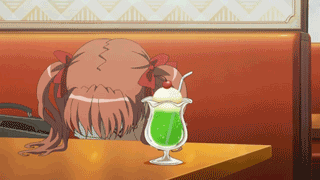
(now you can better understand the tone of the preface to the second edition)
Bonus:
"we consider the evils which render the work unfit for perusal (for we go that length in regard to it,) to arise from a perverted taste and an absence of mental refinement in the writer, together with a total ignorance of the usages of good society... despite reports to the contrary, we will not believe any woman could have written such a work... at the first glance we should say, none but a man could have known so intimately each vile, dark fold of the civilized brute's corrupted nature; none but a man could make so daring an exhibition as this book presents to us. On the other hand, no man, we should imagine, would have written a work in which all the women, even the worst, are so far superior in every quality, moral and intellectual, to all the men; no man would have made his sex appear at once coarse, brutal, and contemptibly weak, at once disgusting and ridiculous. There are, besides, a thousand trifles which indicate a woman's mind, and several more important things which show a woman's peculiar virtues. Still there is a bold coarseness, a reckless freedom of language, and an apparent familiarity with the sayings and doings of the worst style of fast men, in their worst moments, which would induce us to believe it impossible that a woman could have written it. A possible solution of the enigma is, that it may be the production of an authoress assisted by her husband, or some other male friend: if this be not the case, we would rather decide on the whole, that it is a man's writing."
We love a person who can read a book about how women, even high class women, do not and cannot escape horrifying scenes of abuse and degradation by men in Victorian society, and are, because of their special legal and economic vulnerability, most often the target of it, and go "this couldn't have possibly been written by a woman because ladies cannot have any experience whatsoever of such things."
#Anne Brontë#The Tenant of Wildfell Hall#historical literature#the wilful blindness is strong with this one
359 notes
·
View notes
Text
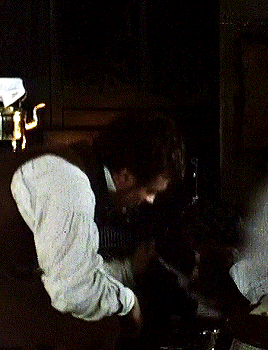
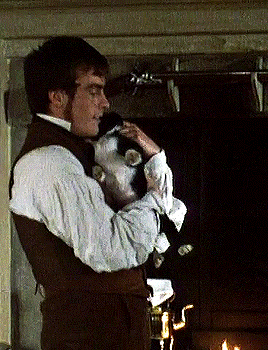
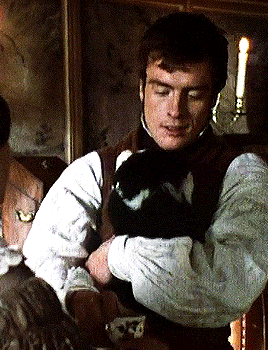
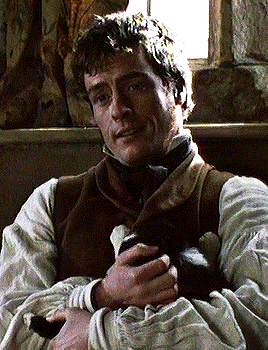
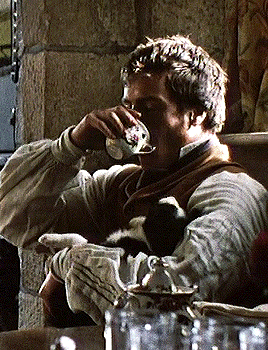
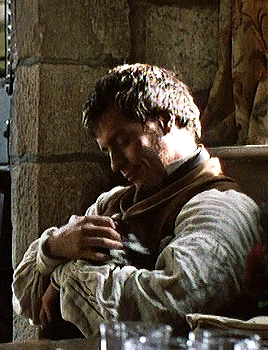
Toby Stephens as Gilbert Markham in THE TENANT OF WILDFELL HALL Part I.
#the tenant of wildfell hall#the tenant of wildfell hall 1996#toby stephens#gifs*#tvedit#perioddramaedit#dailyflicks#useroptional#cinematv#cinemapix#chewieblog#userbbelcher#perioddramasource#tusereliza#adaptationsdaily#anne bronte#tvarchive#smallscreensource
859 notes
·
View notes
Text










The Tenant of Wildfell Hall — 1996 dir. Mike Barker, adapted from the novel by Anne Brontë
#the tenant of wildfell hall#mine:caps#mine:edit#op#tvedit#cinematv#periodedit#perioddramaedit#perioddramasource#weloveperioddrama#bookstofilms#adaptationsdaily
273 notes
·
View notes
Text
When you get down to it, Jane Eyre and The Tenant of Wildfell Hall basically have the same premise. They both feature a protagonist (Jane Eyre/Gilbert Markham) who falls in love with someone (Edward Rochester/Helen Huntingdon) who turns out to be already married. The books are even written by sisters. (Charlotte and Anne Bronte, respectively).
While Rochester and Helen are both unhappy in their marriages (Rochester's wife is insane and Helen's husband is unfaithful and abusive), the way they handle their situations could not be more different though. Rochester keeps his wife locked in the attic and keeps her existence a secret from all but a select few, letting the rest of the world think he is a bachelor. He deceives Jane as well and even tries to marry her, almost committing bigamy in the process. It's only the timely arrival of Rochester's brother-in-law Richard Mason at the wedding that the truth comes out.
Helen, on the other hand, runs away from her husband, taking her young son with her. She pretends to be a widow. But when she realizes Gilbert has fallen in love with her and wants to marry her, she comes clean to him about her marriage and says she cannot marry him because she is married.
Helen acts more nobly than Rochester and yet, of the two novels, it's the latter that was considered controversial at the time it was released with even Charlotte criticizing it for featuring a woman leaving her husband. Helen never tried to commit bigamy but somehow a woman leaving her abusive husband was considered worse at the time. It really is mind blowing.
207 notes
·
View notes
Text
A few years ago, I had the idea of making one of those movies about a girl who falls in love with some asshole “bad boy” with the idea that she can “fix him” with her good influence, but it’s portrayed in a realistic way, and instead of improving, he becomes more and more abusive, until she has to escape.
A couple of days ago, I started reading The Tenant of Wildfell Hall, and finished it yesterday… and I realized that Anne Brontë already beat me to it 177 years ago.
#and i have no complaints whatsoever!#raya reflects#the tenant of wildfell hall#anne brontë#anne bronte#it was really depressing in quite a few parts but i loved it#i have devoured jane eyre and wuthering heights in addition to this#and i can’t wait to discover the rest of the brontë sisters’ bibliography!!#does it show that have been in therapy for over 8 years??
199 notes
·
View notes
Text
I've always struggled a little to get into the novels of the Brontë sisters; Jane Eyre took approximately the first one hundred pages for me to be sold on it, and I had to try a second time with Wuthering Heights after failing to get into it the first time....
... but I started The Tenant of Wildfell Hall last night and... Anne Brontë what on earth did you put in this novel? It is addictive, I can't put it down!!!
Maybe it's because I'm more used to reading classics now, or had a clearer idea of what a Brontë novel entails... but I can already tell this is a masterpiece and an instant favourite. Cannot wait to see how the plot unfolds, my jaw has already dropped several times...
#cora reads#the tenant of wildfell hall#anne brontë#the brontë sisters#classic lit#i just got onto helen's diary and i fear i'll emerge dehydrated and bleary eyed in a few hours after devouring it#because i don't want to put it DOWNNNN
87 notes
·
View notes
Text
I need to get way too excited about this extremely basic edition of The Tenant of Wildfell Hall.

It's just an old Barnes and Noble edition. But it's also the best possible cover this book could have in this format. That purple is the perfect color for this book! That picture! Covers of this book usually feature the hall, but this one features Helen! She's an artist! She's looking straight at you! She's demanding to be the focus of the story! It's like it was made for this book!
And then the inside!

That beautiful clear font! The kerning! The white space! It's so beautiful I could cry! That is how you format classic literature so people can actually read it!
I just love how all these little details come together to make this nothing-fancy edition into the ideal copy of this book for me.
174 notes
·
View notes
Text
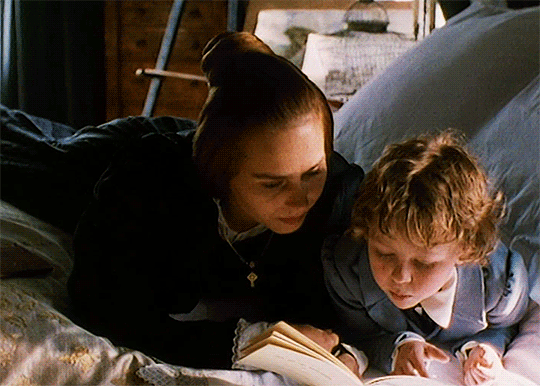







The Tenant of Wildfell Hall (1996)
#the tenant of wildfell hall#anne brontë#the bronte sisters#period drama#perioddramaedit#perioddramasource#perioddramagif#perioddramacentral#perioddramasonly#movie gifs#helen graham#gilbert markham#i just watched this and i loved it so ofc i went into the tags but i could only find like 3 gifs??? so i had to step in#like ik this isn;t going to get any notes but it's for me and maybe the 2 other ppl who are currently watching it rn lol <3#my gifs
57 notes
·
View notes
Text
The screenshot below is what I mean by people taking something a male love interest did, and blowing it out of proportion to make him look like the worst:

[Source — Link TW: Rape mention]
To add to my annoyance, the author of these takes thinks Charlotte and Emily Bronte were "into weird men" (they even provided a link to that obnoxious comic) merely for, what, not writing Rochester and Heathcliff as complete jerks with no redeeming features a la Arthur Huntingdon?

Ugh. Shut up about that word. Charlotte and Emily didn't "romanticize" their Byronic heroes' douchey behavior.
Rochester got punished by God.
Story-wise, Heathcliff's abusive behavior is treated as bad thing (poor Linton Heathcliff). And he died — his unwanted, "outsider" presence gone from Wuthering Heights and Thrushcross Grange.
Romanticized, my foot!
#jane eyre#wuthering heights#the tenant of wildfell hall#edward rochester#heathcliff#arthur huntingdon#the bronte sisters#my posts
84 notes
·
View notes
Text
"You have to forgive the sexism in this book because it was a product of its time" Anne Bronte did not write The Tenant of Wildfell Hall in 1848 just for me to put up with sexist bullshit written a hundred years later.
177 notes
·
View notes
Text
Thinking of Tenant and I'm like those villagers really judged Helen for...
loving her 5 yo old son huh
#thinking of how they criticized her for being close to him and not letting him go far away#they were like oh you'll coddle him HES A MAN#hes 5#the tenant of wildfell hall#anne bronte
66 notes
·
View notes
Text
In a letter to W. S. Williams (14 August 1848), Charlotte Brontë compares Jane Eyre’s Rochester to the Byronic heroes of her sisters’ novels, Heathcliff from Emily’s Wuthering Heights and Huntingdon from Anne’s The Tenant of Wildfell Hall:
“You say Mr. Huntingdon reminds you of Mr. Rochester. Does he? Yet there is no likeness between the two; the foundation of each character is entirely different. Huntingdon is a specimen of the naturally selfish, sensual, superficial man, whose one merit of a joyous temperament only avails him while he is young and healthy, whose best days are his earliest, who never profits by experience, who is sure to grow worse the older he grows.
Mr. Rochester has a thoughtful nature and a very feeling heart; he is neither selfish nor self-indulgent; he is ill-educated, misguided; errs, when he does err, through rashness and inexperience: he lives for a time as too many other men live, but being radically better than most men, he does not like that degraded life, and is never happy in it. He is taught the severe lessons of experience and has sense to learn wisdom from them. Years improve him; the effervescence of youth foamed away, what is really good in him still remains. His nature is like wine of a good vintage, time cannot sour, but only mellows him. Such at least was the character I meant to portray.
Heathcliffe, again, of Wuthering Heights is quite another creation. He exemplifies the effects which a life of continued injustice and hard usage may produce on a naturally perverse, vindictive, and inexorable disposition. Carefully trained and kindly treated, the black gipsy-cub might possibly have been reared into a human being, but tyranny and ignorance made of him a mere demon. The worst of it is, some of his spirit seems breathed through the whole narrative in which he figures: it haunts every moor and glen, and beckons in every fir-tree of the Heights.”
Source: The Brontës Life and Letters (Clement King Shorter, 2013)
#defending her blorbo#charlotte brontë#the bronte sisters#anne brontë#emily brontë#wuthering heights#jane eyre#the tenant of wildfell hall#mr rochester#heathcliff#arthur huntingdon#letters#literature#english literature#character analysis#byronic hero
427 notes
·
View notes
Text
My very specific narrative catnip is stepparents who love their stepchildren with their whole hearts and stepchildren who consider their stepparent to be superior to their deadbeat biological parent and who tell them that out loud. And this doesn't have anything to do with my childhood AT ALL.
#tropes we love#good stepparents#very specific type of found family#silas marner#the tenant of wildfell hall#castaway diva
343 notes
·
View notes
Text
And I would rather have your friendship than the love of any other woman in the world!
~ Anne Bronte, The Tenant of Wildfell Hall
#that's it#i'm playing hard to get forever#because that's how it works in the novels#anyways#GILBERT.#GILBERT YOU CANT SAY THESE THINGS TO ME#the tenant of wildfell hall#quotes#idk how many more me and whos i got left in me#there are many benefits to attending a catholic college
50 notes
·
View notes
Text
When will they stop trying to adapt Wuthering Heights and realize that what we actually need is a new The Tenant of Wildfell Hall adaptation
#imagine a tenant adaptation with jane eyre 2011 vibes... the ost that dario marianelli could give us...#also what's crazy is that i think jacob elordi and margot robbie could kiiiinda work as gilbert and helen?#not my ideal casting by any means but they would be def less miscasted than as HEATHCLIFF AND CATHERINE#(we had one (1) non white heathcliff and everyone said ''let's never do that again!'' i hate it here :))))#disclaimer i don't want emmerald fennell to adapt tenant lol i just wish there was a new adaptation#wuthering heights#the tenant of wildfell hall
72 notes
·
View notes
Text
He is very fond of me - almost TOO fond. I could do with less caressing and more rationality: I should like to be less of a pet and more of a friend, if I might choose - but I won’t complain of that: I am only afraid his affection loses in depth where it gains in ardour. I sometimes liken it to a fire of dry twigs and branches compared with one of solid coal, - very bright and hot, but if it should burn itself out and leave nothing but ashes behind, what shall I do?
Anne Brontë, The Tenant of Wildfell Hall
#the tenant of wildfell hall#anne brontë#1848#1840s#19th century#english literature#queue pierce my soul
67 notes
·
View notes